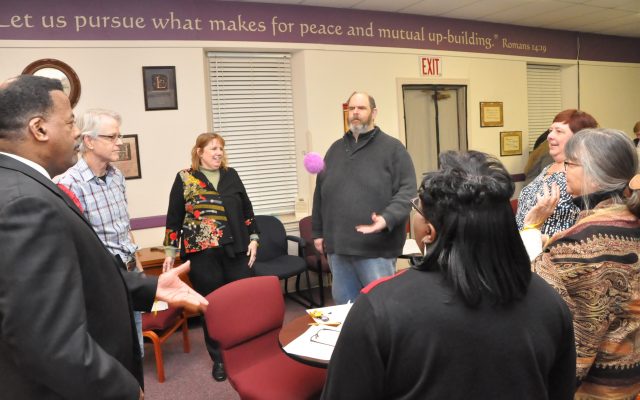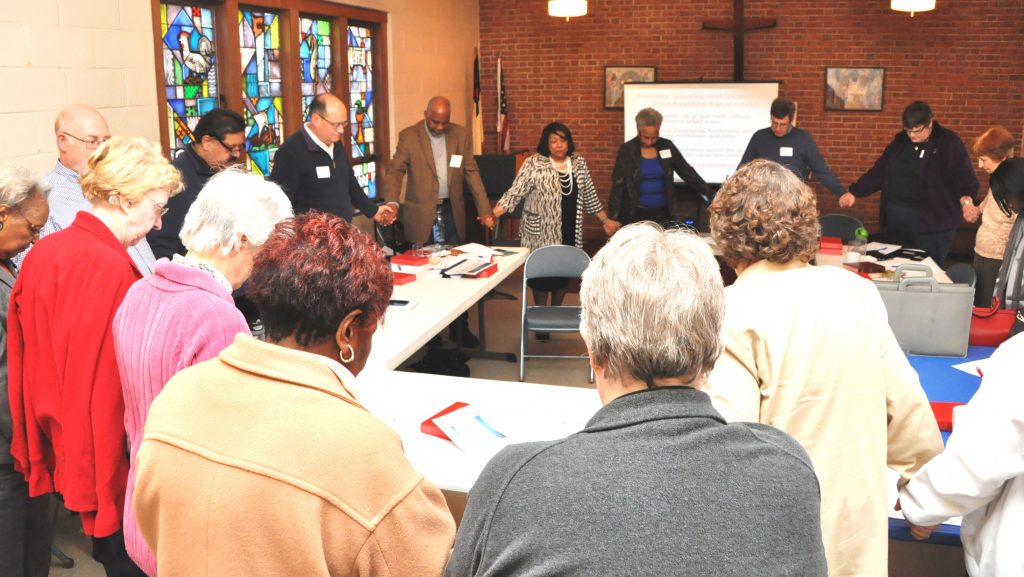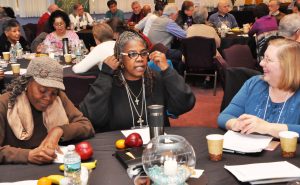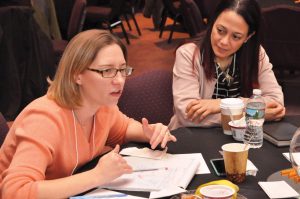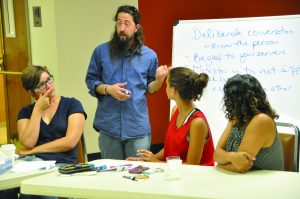Real talk about race is happening around much of the Eastern PA Conference this winter, as dialogues and teaching moments bring people together to explore a difficult but timely topic. And we’ve only just begun.
The Central, Southeast and East districts each have sponsored recent teach and talk events addressing race and racism. The Central District held a Real Talk about Racism event Dec. 3 at First UMC Phoenixville for about 40 people. Participants committed to taking action-oriented “next steps” both personally and with their congregations.
Former Eastwick UMC pastor Helen Stafford Fleming, now a leadership development trainer and consultant, facilitated the dialogue. She helped the group understand the sin of racism as a spiritual disease and our need to become more self-aware, transparent and focused on fostering forgiveness and healing of ourselves and others.
The Southeast District welcomed nearly 40 members to Church of the Open Door in Kennett Square Jan. 16 for an evening of racial learning and dialogue, titled “Becoming the Beloved Community.” The event was aptly scheduled for the national holiday honoring the Rev. Martin Luther King Jr.
Indeed, the Rev. Dawn Taylor-Storm, in her opening devotions, quoted King’s challenge in his pivotal “Letter from a Birmingham Jail” for churches to become “thermostats” that can “transform the mores of society,” not merely “thermometers” that only measure it. The district superintendent likewise challenged members, as well as herself, to be aware of and respond to the prevalence of white privilege and racial inequities in seeking a more just church and society.
‘Becoming Beloved Community’
The two-hour session, with diverse participation, was packed with a lecture on the roots of racism, candid testimonies of white members’ awakenings to racial realities, creative activities to stimulate thinking and engagement, and small-group “vital conversations.”
Members will dig deeper into race concerns at the district’s Tools for Ministry lay leadership training event, April 29, at West Grove UMC. The Rev. Rodney Smothers, a trainer, coach and pastor, who serves in a cross-racial appointment in the Baltimore-Washington Conference, will help participants explore their theme, “What is Beloved Community?”
The East District welcomed the largest crowd—over 100 attendees—to its weekend Conversation on Race Relations at Washington Crossing UMC, Jan. 20-21. Titled “Walk With: The African American Experience,” the event—possibly the first in a series—was mandatory for clergy, but many laity attended also.
Facilitated by the Rev. Tracy Bass, District Superintendent, the gathering viewed the controversial new documentary “13th” on Friday night. On Saturday, they discussed its harsh lessons of racial injustice and related challenges in table groups—many of them racially mixed—spread across the room.
The compelling film portrays the mass incarceration of black Americans as a product of the Constitution’s 13th Amendment, which although outlawing unpaid forced labor—or slavery—in the U.S. in 1865, exempted prisoners from that prohibition. That exemption and other criminal justice laws and policies have led to a system of labor exploitation of prisoners that benefits many American corporations and helps keep jails and prisons running over, especially with black and Latino inmates.
Participants also wrestled with revelations about racial conflict and widespread mistreatment of African Americans by law enforcement officers. Emotional plenary discussions revealed tough, new revelations for many and prompted some to express intentions to seek more knowledge and ways to address racism and other injustices. What seemed key at this event, and perhaps others, were bonds formed from honest, communal sharing of experiences and insights.
3 more districts address race
Looking ahead, the Southwest District will host the fourth of its bi-monthly learning sessions Feb. 20 at Faith UMC Manheim. This time members, led by an interracial team of pastors, will focus on creative actions churches can take, informed by knowledge from their previous guided discussions.
While turnout for their dialogues is good, the leaders look forward to reaching more hearts and minds when they also address racism and social justice at the district’s Tools for Ministry event April 29.
The Northwest District plans to also foster more understanding and involvement in matters of race and reconciliation, according to the Rev. Joe Tyson, Superintendent. That will be a focus of workshops at its Tools for Ministry training event, April 29.
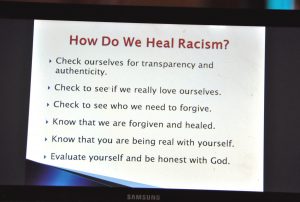 And the Northeast District plans to host three discussions on culture, race and justice Feb 7, March 21 and April 4. Groups of 25 to 35 members will use the General Commission on Religion & Race’s new Vital Conversations resource, and the Rev. Giovanni Arroyo from GCORR will facilitate the second gathering. The aim, said the Rev. Irving Cotto, District Superintendent, is to build a team that can plan a district-wide event to address issues of race, culture and justice.
And the Northeast District plans to host three discussions on culture, race and justice Feb 7, March 21 and April 4. Groups of 25 to 35 members will use the General Commission on Religion & Race’s new Vital Conversations resource, and the Rev. Giovanni Arroyo from GCORR will facilitate the second gathering. The aim, said the Rev. Irving Cotto, District Superintendent, is to build a team that can plan a district-wide event to address issues of race, culture and justice.
Meanwhile, clergy and lay ministers continue to take the required Changing Racism workshop, led by Visions, Inc., and offered again from March 31 to April 2. But some participants in the October 2016 workshop also got to experience an optional follow-up session, titled Changing Racism: Continuing the Conversations. It was held Jan. 28 at the Conference Office.
Co-sponsored by two collaborating conference groups—the Commission on Religion & Race and Healing the Wounds of Racism—the experimental six-hour session offered more teaching of U.S. racial history and culture, and engaged participants in deeper discourse on these topics. More Continuing the Conversations events may follow future Changing Racism workshops to bolster the learning that happens there.
Charter for Racial Justice
The conference’s United Methodist Women are seeking ways to enact the global organization’s recently updated Charter for Racial Justice, which was endorsed by the 2016 General Conference. “We are addressing racial justice from a biblical, leadership, and community perspective,” said Gladys Hubbard, who leads the group. “We believe that racial justice should be an integral part of our spiritual practices.”
Other discussions and actions are planned or already happening in churches across the conference. They signify its commitment to building cross-racial bridges, and indeed a beloved community, that can encourage racial understanding and the pursuit of justice and reconciliation through social change.
For Bishop Peggy Johnson’s detailed report of the conference’s response so far to the Call to Action, a Northeastern Jurisdiction mandate to overcome racism and address the concerns of black churches, visit her page on our conference website at www.epaumc.org/about/bishop-peggy-a-johnson. You can also find photos from some of these dialogues on our Flickr page.
See Reflections on racial dialogues for candid statements from racial dialogue participants.
Photos by John Coleman.

